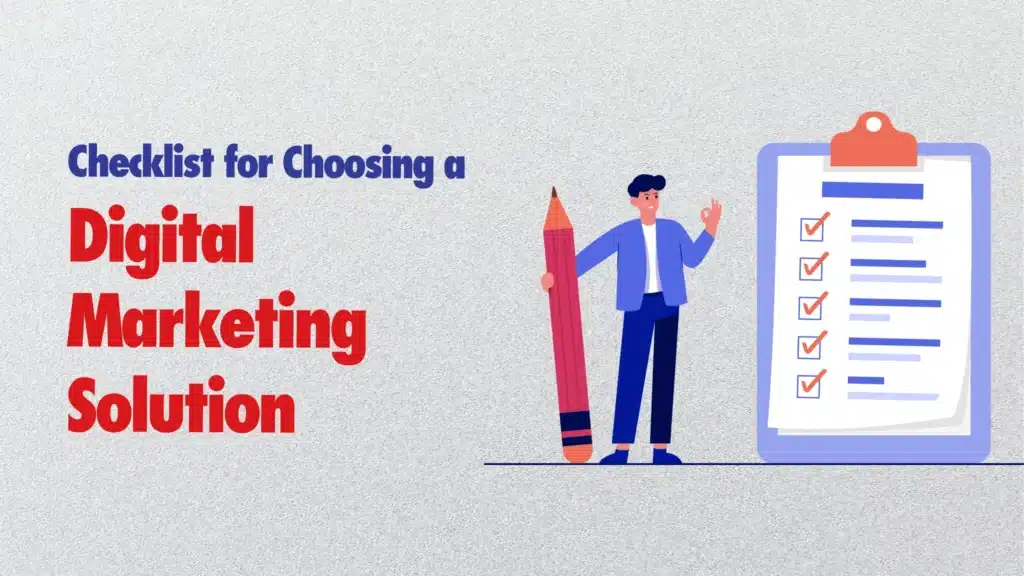The Ultimate Checklist for Choosing a Digital Marketing Solution Provider

Introduction: Choosing the Right Partner Matters
With digital competition at an all-time high, having the right digital marketing solutions partner can be the key to sustainable business growth. From SEO to paid advertising and social media, your chosen provider should not only deliver results but also align with your brand’s vision, audience, and goals.
But how do you cut through the clutter and select the right agency or consultant?
This checklist will help you evaluate, compare, and confidently choose the best digital marketing provider for your business whether you’re a small startup or a growing enterprise.
1. Define Your Goals First
Before you even start researching providers, clarify what you want to achieve:
- Do you want to generate leads, boost brand awareness, or improve sales?
- Are you looking for specific services like SEO, PPC, social media, or email marketing?
- What’s your ideal budget and timeline?
Clear goals help you evaluate whether a provider’s digital marketing solutions match your expectations.
2. Evaluate Their Core Services
Look for a provider with expertise in the digital services you need. Common offerings include:
- Search Engine Optimization (SEO)
- Pay-Per-Click Advertising (PPC)
- Content Marketing & Blogging
- Social Media Management
- Email Marketing Campaigns
- Conversion Rate Optimization (CRO)
- Web Design & Development
- Analytics & Reporting
If you’re looking for an all-in-one partner, ensure they can deliver comprehensive strategies, not just individual tactics.
3. Check Their Track Record
Experience matters. Ask these questions:
- How long have they been offering digital marketing solutions?
- Do they have experience in your industry?
- Can they show case studies or success stories?
- Are there measurable KPIs (e.g., 150% increase in organic traffic, 3x ROI)?
A credible provider should have a portfolio and proven results to back their promises.
4. Review Their Team and Tools
Behind every successful campaign is a capable team and the right technology. Ask about:
- Who will be working on your account?
- Do they have in-house experts or outsource work?
- What tools do they use for SEO, PPC, reporting, and analytics?
Reputable agencies leverage top tools like Google Analytics, SEMrush, Ahrefs, HubSpot, and Meta Ads Manager to drive performance.
5. Look for Industry Certifications and Awards
While not mandatory, certifications add credibility. Look for:
- Google Partner or Meta Business Partner status
- HubSpot or Salesforce certifications
- Awards or mentions in industry publications (Clutch, G2, etc.)
These signals indicate that the provider takes their craft seriously.
6. Transparency in Pricing and Reporting
Avoid vague pricing models. Ask for:
- Clear breakdown of monthly fees or project costs
- Details on what’s included and what’s not
- Reporting frequency (weekly/monthly)
- Access to dashboards or campaign performance tools
Great providers use data to guide strategy and share it with you.
7. Assess Communication and Culture Fit
Even the most skilled marketers can fall short if there’s poor communication or mismatched values. During your consultation, consider:
- Are they listening to your needs?
- Do they ask thoughtful questions?
- Are they proactive or reactive?
- Do you feel a sense of partnership, not just service?
Effective digital marketing is a collaboration not a one-way service.
8. Client Testimonials and Reviews
Always check Google reviews, testimonials on their website, and third-party platforms like Clutch or Trustpilot.
Look for:
- Long-term client relationships
- Clients in similar industries or business sizes
- Feedback about responsiveness and ROI
If a provider has glowing testimonials from a variety of businesses, that’s a strong green flag.
9. Scalability and Flexibility
Your business may grow, pivot, or change. Make sure your digital marketing partner can evolve with you by offering:
- Flexible service packages
- Scalable strategies (from local to international)
- Support for new platforms and technologies
- Agile responses to algorithm changes or trends
10. Trial Project or Short-Term Commitment
Not ready to sign a long-term contract? Ask for a:
- Discovery audit
- Short-term project (e.g., 3-month SEO trial or PPC test)
- One-time campaign management to gauge fit
This allows you to assess performance and communication before committing fully.
Bonus Tip: Avoid Red Flags
Guaranteed #1 rankings on Google
Vague strategy with no data to back it
No clear team structure or point of contact
Outsourced work without transparency
Pushy sales tactics without listening to your goals
Choose a provider that focuses on long-term success, not short-term gimmicks.
The Digital Marketing Provider Checklist
Here’s a quick checklist you can save:
Clear on your goals
Offers relevant services
Proven track record
Certified team and tools
Transparent pricing
Clear communication
Strong testimonials
Scalable and flexible
Willing to offer a trial
No red flags
Conclusion: Find the Right Fit, Not Just the Flashiest Pitch
Choosing the right provider of digital marketing solutions is one of the most important decisions for your brand’s online growth. Use this checklist to vet providers thoroughly and find a partner who brings strategy, transparency, and measurable value to the table.
The right provider won’t just boost your traffic they’ll boost your business.
FAQs
Q: How much should I budget for a digital marketing provider?
A: It varies based on your goals and service scope. Small businesses may start at $500–$2000/month, while larger strategies may cost significantly more.
Q: How soon will I see results?
A: SEO can take 3–6 months; PPC can show results faster. A reliable provider will set realistic expectations.
Q: Should I choose a local provider or go global?
A: It depends on your market. If your audience is local, a provider with regional experience can be beneficial. For international growth, look for global experience.